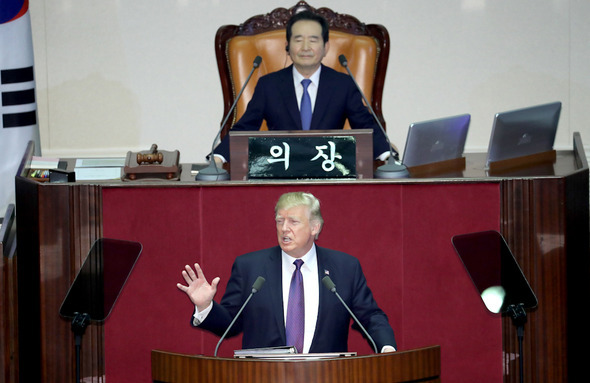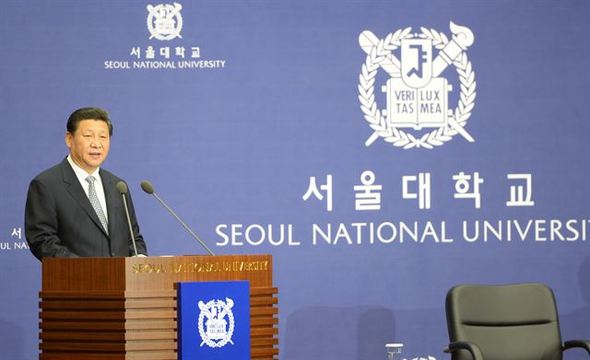 |
|
US President Donald Trump delivers a speech to the National Assembly on Nov. 8. It was the first time a US President had spoke at the venue since Bill Clinton on July 10, 1993. (EPA/Yonhap News)
|
Two leaders' blunt talk puts pressure on President Moon's balanced diplomacy
Seeing US President Donald Trump’s first visit to South Korea brought up images of Chinese President Xi Jinping’s visit around three years ago. In both cases, the visits lasted two days. Just as some South Korean observers voiced worries about Trump spending less time here than in his three-day visits to China and Japan, so there were those who fretted about Xi’s schedule as well. Back then, Xi was preparing to visit South America to attend a summit of BRICS nations (Brazil, Russia, India, China, and South Africa). The worry was that Xi would be merely passing through South Korea on his way to South America, treating it as a secondary stop. In the end, their fears were put to rest when it was arranged for Xi to visit South Korea only. With Trump’s visit, there were no schedule adjustments. Some news reports suggested his decision not to set much of a schedule for his third day in Japan was a gesture toward Seoul, but it did not allay the worries. Many in South Korea anxiously compared the various protocols and schedules, fearful that the US and China might neglect the country. While all of that may be important, what was more concerning about Trump and Xi’s South Korea schedules were the hints they gave in respectively addressing North Korea and Japan. Both leaders gave speeches and talks in which they spoke out boldly on things they hadn’t mentioned when they were with the South Korean president. They may have confined themselves to predetermined remarks in diplomatic settings where only pre-coordinated opinions were voiced – but on their own stages, they played fully into their respective images. Trump has not been shy with his harsh rhetoric toward North Korea since being elected last year, but in his Nov. 7 summit with South Korean President Moon Jae-in, the restraint was evident in his remarks about “work[ing] together to resolve this problem using all available tools short of military action.” Even the US media were startled at the change in tone. It didn’t last. His National Assembly speech the next day was, for the most part, little different from the grim recollections offered by North Korean defectors. This naturally segued into a characterization of North Korea as a “hell” and its leaders as “tyrants.” Trump’s hardline colors remained intact.
 |
|
Chinese President Xi Jinping speaks at Seoul National University’s Global Education Center for Engineers on July 4, 2014.
|







